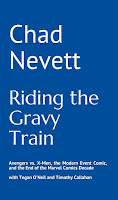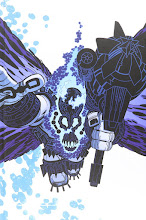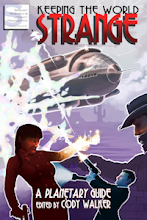Picked up the trade edition of Identity Crisis today and figured it would be a good book to discuss here. I knew last week I would get it today. I was actually going to pick it up last week, but since the bookstore had both volumes if Authority: Revolution, I didn't want to take my chances that both volumes would still be there this week.
I read Identity Crisis when it first came out since my dad was buying it. Can't say that it impressed me at the time. I didn't hate it, but I didn't like it either. Mostly, it made me just sort of shrug in apathy--except for the Batman mindwipe thing, which annoyed me a lot (but I'll discuss that in a few moments). But, reading a story like this when it comes out in serial form isn't the same as reading it in one sitting. It was obviously designed to be read in a single sitting (or something approximating one, similar to a novel--not spread over seven months--if it came out on time, which I can't remember if it did the entire way through).
I will say this: the first issue really got me this time. It is engaging on both a plot/story level and an emotional one. You feel for Ralph. It's obvious what's coming--and Meltzer is self-conscious about it in Ralph's narration--but even so, he puts it in a solid emotional context.
The only downside, really, of that first issue is the art because Rags Morales draws the dumbest-looking eyes I've ever seen. Throughout the entire book, I was constantly distracted by goofy, way too big eyes. Goddamn, I hate them.
I don't know where the story lost me, but it was somewhere in issue two or three. Probably when the focus shifted to the villains. Took me right out of the story. In the larger structure of the story, I can see why Meltzer did it, but I don't think it works. In a story about family and superheroes, giving the other side a voice like that kills the point. It doesn't matter if you're trying to show that they have the same concerns (as in the Captain Boomerang subplot) because, as is pointed out several times, the villains would use the heroes' families to hurt them, while the heroes wouldn't do that.
The narration throughout, actually, posed a problem for me. The only real constant voice we get is Green Arrow's plus whichever voice is convenient to the story. Here's a quick breakdown of narrators:
Issue one: Ralph, Superman, Nightwing, Green Arrow, Bolt, Sue, Robin, Black Lightning, and the Atom. Plus, the omniscient voice that tells us the where, when and who of the scene.
Issue two: the Atom, Green Arrow, Merlyn, Dr. Mid-Nite, and the omniscient voice.
Issue three: Green Arrow, Robin, and the omniscient voice.
Issue four: the Atom, Green Arrow, Batman, Lois Lane, and the omniscient voice.
Issue five: Green Arrow, the Atom, either Captain Boomerang or his son (it isn't clear as there are only two captions with this voice, and either could be thinking it), Robin, and the omniscient voice.
Issue six: Batman, Green Arrow, and the omniscient voice.
Issue seven: the Atom, Green Arrow, Superman, and the omniscient voice.
As a whole story, it comes across as fragmented and uneven. Perhaps, as individual issues, it isn't as jarring--I certainly didn't notice it when I read it as a serial. This time, though, it was painfully obvious. As the list shows, certain narrators showed up a lot, especially Green Arrow. In fact, Green Arrow's narration is the only one that rarely lasted for more than a page or two. Most shifts in narration only lasted for a page or two (or, in the case of the Captain Boomerang/his son, one panel).
This problem stems from the fact that Meltzer tries too hard to make it a universal, affecting everyone story when it isn't that kind of story. Okay, it is in the sense that it does affect everyone, but those viewpoints are often showed through Green Arrow's narration--so why bother with the others? Meltzer seems to realise this after the first Dr. Mid-Nite narration where he begins the autopsy, because the next time we see him, Mr. Terrific is there so there's someone he can talk to instead of using first-person narration. I'm certain most of the other excess narrators could have been excised, focusing the story more and giving it a consistent voice.
While I'm on stuff that bothered me: how did the heroes not check the Dibnys' phone records? Mister Miracle says, after Jean (Atom's ex-wife) is "attacked," that there are seventeen ways to get past the defences these houses have and I'm certain he knows the phone is one. Shit, how many episodes of Law & Order include checking phone records? Um, like all of them (probably not all, but a very large majority). "Shit, she got a call from the Atom's ex-wife right before dying. Maybe we shoul check that out."
Actually, while checking on the murder just now, I'm confused how it actually happened. In the first issue, Sue is talking to Alfred (Batman's butler) on the phone, hangs up, hears a noise elsewhere in the house and then later we see her attacked and burned--and had apparently called for help using the JLA signalling device. And then, in the final issue, we see that Jean got into Sue's brain through the phone (so what was the noise Sue heard in the house?), causing a blockage--which, strangely enough, still gives Sue enough time to signal for help somehow. That, and the fact that the various showings of the murder have conflicting ideas. First, she's seemingly thrown onto a table, but then it's because her brain is all fucked up (with the phone on the table exactly as she left it in the first issue), but then she's on her knees convulsing because her brain is all fucked up (right after she answered the phone and let Jean into her brain, which apparently fucks her up immediately--so how did she place the phone down calmly on the table?).
Maybe it works, but I'm not seeing it.
Now, for the Batman problem. When I first read the series, I didn't believe Batman would give a fuck about Dr. Lite and the League messing with his brain. To me, Batman has one line: murder. He won't kill a bad guy, but he'll do anything and everything else. But, Green Arrow says something that I missed before (and a friend I debated the issue with hinted at, but I dismissed--so I was wrong): "Bruce would never stand for it. Not without his say-so." A good line that invalidates my argument. Batman doesn't care, he's just an asshole control freak. Fair enough.
For the most part, the story was good. I especially enjoyed the fight with Deathstroke in issue three (although, why didn't Green Arrow just stab Deathstroke in his working eye and, you know, get rid of a villain/assassin--I know, because that would be like killing him off, in a way, and you can't do that--except to minor, supporting characters like Sue Dibny and Jack Drake). The mystery was compelling and did make sense, with a few lines and panels early on that seem more ominous if you know Jean is the killer already.
But, shit, the narration (which, even though I don't like the technique Meltzer uses, is always well-written), goofy eyes and the murder itself bugged the fuck out of me. Definitely enjoyed it more than the first time I read it, though, and would recommend picking it up.
skip to main |
skip to sidebar
"Chad Nevett is the spicy mustard of comics reviews" -- Adam Langton, Lovable Fucker and Chad Nevett's Best Man
About
GraphiContent was a blog featuring comic criticism, commentary, analysis, theory and discussion. Oh, and the odd rant, review or totally random post.
Chad Nevett has a BA in English and political science, and an MA in English Language & Literature--Creative Writing. He was a reviewer for Comic Book Resources, blogger for Comics Should be Good, and writer for 411mania. He resides in Windsor, Ontario with his wife and her cat. He can be reached at chevett13[at]yahoo[dot]ca.
Notable Posts (In Chronological Order)
- The Future is X-Rated: Marvel Boy, the Modern World, and the History of the Marvel Universe
- A Music Video on Paper: The Final Chapter of Codeflesh
- Tony Stark, Futurist
- "All you need is fuck."
- Man v. Superman
- Civil War v. Infinite Crisis
- Building a Better Batman: Grant Morrison's First Year on Batman
- U.S. v. T.H.E.M. with Little Ol' Me Stuck in the Middle
- Mark Millar's Ultimate X-Men
- Building a Better Batreader: Grant Morrison's Second Year on Batman
- Secret Invasion Reading Order (Updated June 29, 2013)
- Top 25 Warren Ellis Comics (Oct. 2009)
- Building a Better Batfamily: Grant Morrison's Third Year on Batman (and Robin)
- You Don't Just Want to Break Me, You Want to Tear Me Apart
- 50 Things I Learned in My Three Years and Four Months as a Reviewer for Comic Book Resources
- Avengers vs. X-Men Reading Order (Updated August 17, 2013)
Notable Collections of Posts (In Semi-Chronological Order)
- Joe Casey Comics Archive
- Countdown to Who Cares?
- The Chad and Steve Q&A Series
- I've Got 52 Problems, but a Bitch ain't One
- Best of 2007
- Hello Cosmic: The Works of Jim Starlin Archive
- Chad's Jackass Comic Creator Interviews from 2001
- The Superman 2000 Pitch (with Tim Callahan)
- Raymond Chandler's "Twelve Notes on the Mystery Story"
- Best of 2008
- Blogathon 2009: Brian Michael Bendis's Avengers
- Best of 2009
- Art Discussion Month 2010
- Five Years Blogging: A Life Well Wasted (with David Brothers)
- Booze, Broads & Bullets: Sin City
- Blogathon 2010: Hellblazer (and Hellblazer Posts Beyond the Blogathon)
- Best of 2010
- 28
- Blogathon 2011: Superhero Comics of the Past Decade
- Best of 2011
- Riding the Gravy Train (Avengers vs. X-Men) Archive
- Blogathon 2013: Comics Critics All-Stars
- Best of 2012
Links
Blogs Worth Reading
-
-
The X-Axis – w/c 15 April 202411 hours ago
-
-
-
-
The Mighty Crusaders Number Four #031 month ago
-
The Last Thorsday1 month ago
-
Everybody’s Rockin’6 months ago
-
-
Social (Science) Fiction8 months ago
-
The Rest of the Cruise1 year ago
-
-
-
-
Untitled 1:5 years ago
-
Farewell, sweet prince6 years ago
-
Hello World6 years ago
-
-
-
That’s a wrap.9 years ago
-
episode 026: exit the world10 years ago
-
-
Books Read in 201211 years ago
-
Building Stories - Suggested Reading Order11 years ago
-
Final Crisis #715 years ago
-






